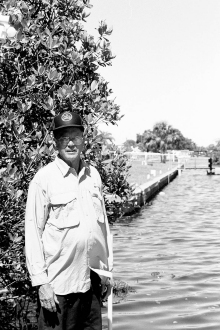|

Approaching from a boat on the Little Manatee River, it's easy to tell where Gus Muench lives. Float past lot after lot lined with bare concrete seawall, and the mangroves flourishing outside his home clearly show that Muench is not your average Floridian.
A commercial crabber for 25 years, Muench was a driving force behind the creation of the Cockroach Bay Users Group and served as president of the Little Manatee Preservation Committee. Working around an incredibly demanding occupation that requires him to be on the job most mornings long before dawn, he volunteers as a speaker, sharing his love for the bay's flora and fauna with groups ranging from boaters to Boy Scouts.
To encourage fish, birds and crabs to take up residence along concrete seawalls, the lifelong Hillsborough County resident builds artificial reefs. And in his spare time, he serves on a long list of organizations, earning awards from groups including Audubon of Florida and the Florida Wildlife Federation.
To some degree all those volunteer activities give him a voice in the decisions that affect his livelihood. For instance, manatee zones that require slow speeds or no wake make it more time consuming and expensive to get from one trap to another. New county manatee zones (see related story page 3) allow exemptions for commercial fishermen.
In Cockroach Bay, the program is voluntary, with a users group Muench helped establish - now known as C-BUG - erecting buoys and signs at boat launches and distributing boater education packages funded in part through a series of grants from the Tampa Bay Estuary Program.
"You have to get involved in things that are important," he says. "No one else will do it for you."
The artificial oyster reefs he builds are a perfect example. The four-foot polyethylene tubes host hundreds of tiny animals almost from the very start. As the reef grows, oysters, shrimp and small fish attract larger fish that bring in the birds. Over time, mangroves put down roots and provide homes for more birds and crabs, which attract more and more fish.
Lean over his dock, and the water is alive. Minnows swim in tight formation, pistol shrimp make a distinctive popping sound and larger fish leap just offshore. Mangrove crabs thrive in their namesake trees, until they become a favored snack for the yellow-crowned night heron that returns to his yard year after year.
"Go next door and you won't see any fish because there isn't anything there for them to eat," he says.
Muench is somewhat discouraged that people who own waterfront homes don't seem to miss the wildlife. "I guess they don't appreciate the things they can't see - they'd rather have a rose bush than a reef."
He learned to fish as a child from his uncle, who taught him to make and use cast nets. He spent 30 years working for GTE and crabbing on the side, before retiring 12 years ago to crab full-time.
With about 500 traps, he catches up to 1,500 pounds of crab a week. That works out to be about 3,000 of the tasty critters also known as Callinectes sapidus, Callinectes being Greek for beautiful swimmer and sapidus coming from the Latin word for savory.
He's catching far fewer crabs these days, however, even though he can't put his finger on an exact reason. Blue crabs grow best in low-salinity habitats, so freshwater is critical. When it's in short supply, crabs retreat up rivers where the water is fresher, but there are more people.
The fact that water in Tampa Bay is clearer doesn't necessarily benefit crabbers because the crabs thrive on detritus, or small particles of organic matter like oak leaves and other vegetation that wash into the bay from land.
The growing number of people who share the region's rivers and streams isn't helping either. "There are too many people on the water and the new crowd doesn't want to see fishermen out there working," he says.
Although he and his wife, Betsy, have three sons, none followed in their father's footsteps. One is an engineer, another is a financial analyst and the third is working toward a Ph.D. in astrophysics.
"I never encouraged them to join me," he says. "But as for me, it's in my blood - I have to be on the water."
For a presentation on Cockroach Bay or the Little Manatee River, contact Gus Muench at 813-645-6063.
Top
|